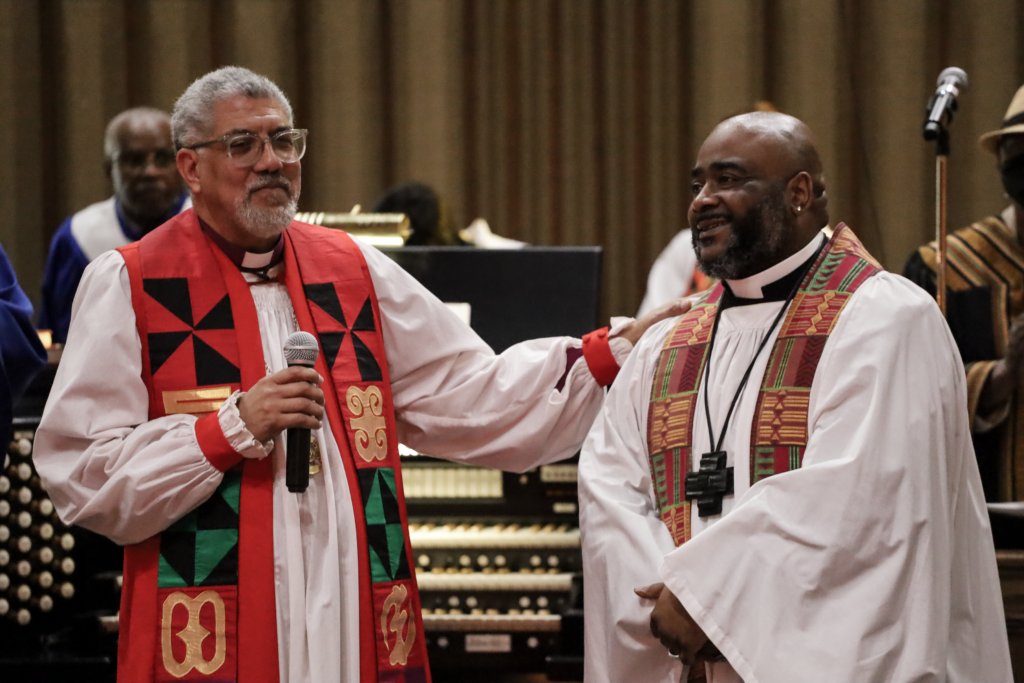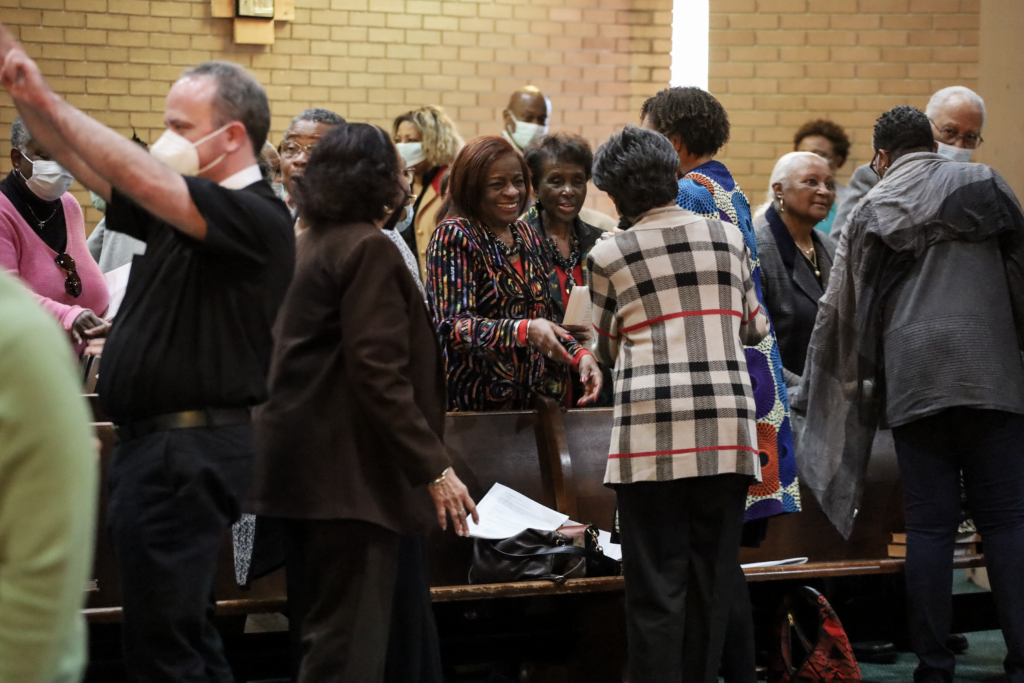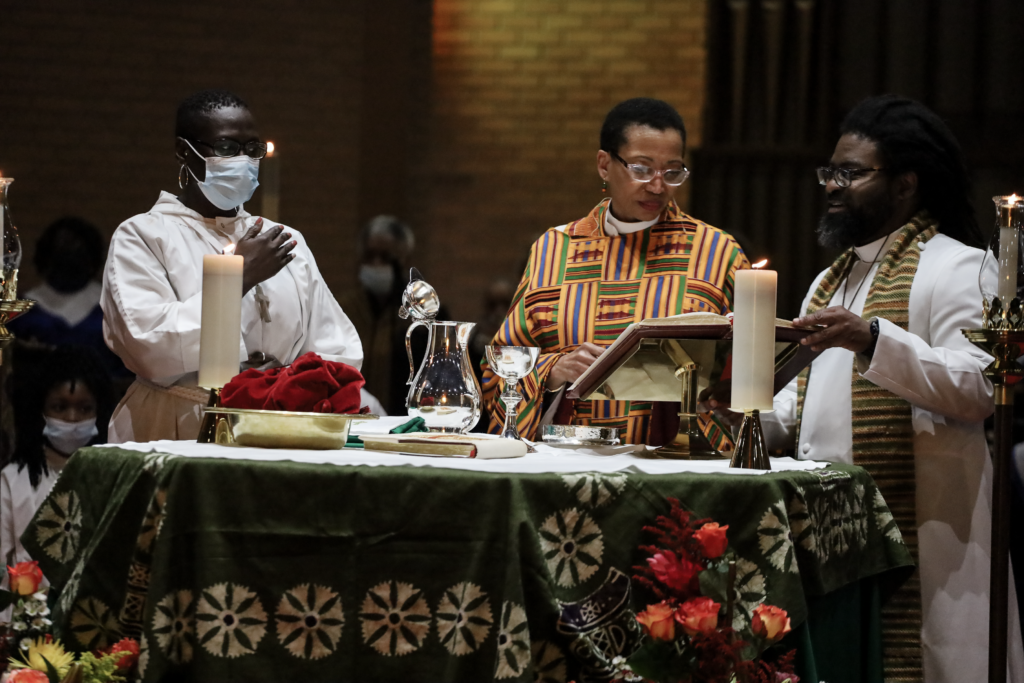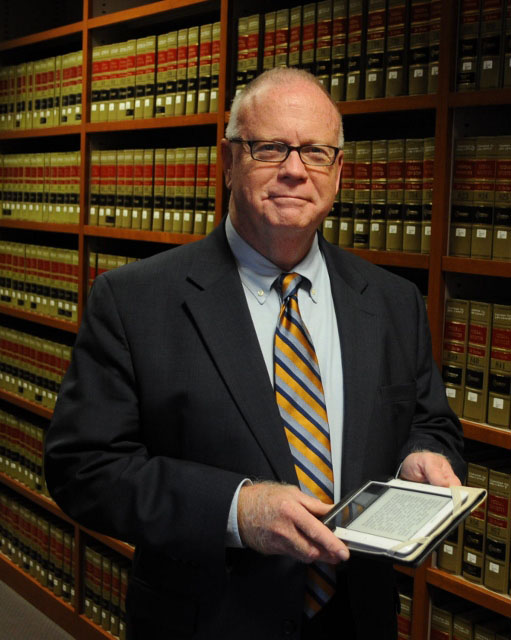
The life of the first Black Episcopal priest is a blueprint for building an active faith life, Bishop Rob Wright said during the annual Absalom Jones commemoration.
The February 19 service, sponsored annually by The Union of Black Episcopalians, was held this year at Holy Cross Episcopal Church in Decatur, where The Rev. Dennis Patterson, Jr. is Priest-in-Charge.
Bishop Wright began his sermon by ticking off Jones’ biography and accomplishments.
- Jones was born in Delaware in 1746, 30 years before America was America.
- At 16, Jones, his mother and his six siblings were sold by their owner, then separated.
- Jones’ new owner allowed him to receive four years of education at a Quaker night school.
- At 20, Jones married Mary King and bought her freedom.
“He bought her freedom first,” Wright said. “So, that his children would never be able to say that they were born enslaved. So, that they would be born free. He bought his own freedom, listen now, 18 years later, when he was 38.”
In 1787, the same year that that the United States Constitution was being drafted, debated and signed at Independence Hall in Philadelphia, Jones and Richard Allen organized a walkout at St. George’s over the poor treatment of black congregants.
“Three years later, now you got to get this now, three years later, he was so successful in welcoming black people to church that he scared the white folks at St. George’s Methodist Church. I’m not making it up, look it up. In fact, it’s in the bio in the front of your program. Their response to this church growth was to segregate blacks to the balcony without giving them any advance notice. ‘Good morning, welcome to St. George’s, you sit in the balcony.’
“Three years later, just three years later, Jones and Allen founded the Free African (benevolent) Society. A society that begins to network with similar kinds of organizations across state lines. This is the 18th century y’all. It also collected dues and had an independent economic component.
In 1794 Jones founded the first black Episcopal congregation, and in 1802, he was the first African American to be ordained as a priest in the Episcopal Church of the United States. He is listed on the Episcopal calendar of saints.
“Five years later, they start building the church. Two years later they complete it. That’s a feat even right now. They were admitted to the Episcopal Diocese of Pennsylvania the same year and Jones was ordained a deacon one year later. He would become a priest seven years later, when he was 56 years old. He would die 16 years after his ordination at the age of 72,” Wright said.
Jones’s friend Richard Allen became a Methodist preacher and was a founder of the African Methodist Episcopal Church (AME), now one of the largest independent African American denominations in the country.
The Blueprint
Wright then turned to the lesson to be learned from Jones’ accomplishments.
“My thesis behind this brief presentation of history is that while Absalom Jones was the first African American Episcopal priest, we get the best and most enduring sense of him and how he understood God and himself as a layperson and a deacon.
“Put that idea into biblical terms and we would say that we know Absalom Jones best by his fruit. A lot of people talk about ministry, Absalom Jones bore fruit. And while some folks will pay attention to his Blackness this month, and even the racism that he rebukes throughout his whole life by word and example, I want to pay attention to his blueprint. Jesus is the pioneer and perfecter of our faith. I got that real clear. But Absalom Jones is the blueprint for us who are called to follow Jesus in the church.”
The Absalom Jones Episcopal Center for Racial Healing is an example of building upon Jones’ blueprint. Created by the Diocese of Atlanta, The Center opened in October 2017. Its model of prayerful education forms and reforms individual and collective action. Its curriculum, training, pilgrimages, and dialogue have become the standard for racial reconciliation work in and beyond The Episcopal Church.

Black Episcopal Leader Recognized
Wright offered a prayer for The Rev. Ricardo Bailey who was about to leave the diocese to become rector of Calvary Episcopal Church in Charleston, South Carolina. With all priests and deacons at the service surrounding Bailey, Wright prayed for Bailey’s new ministry at the historically African American parish founded in 1847 as a church for enslaved and free persons of color.
“Gracious God, what a wonderful God you are. You call us according to your grace. You dig deep the well have faith in us. We know well your love for us. Lord, we pray that you will continue to bless Ricardo, his mind, body and soul, and make him whole. We pray Lord, that you would touch his tongue and give him the eloquence that compels hearts to faith. That you protect his family. Make his home a haven of your blessing. Help people see him but see past him and see you. Give him a new ableness. A new readiness. A new joy. A new zeal for your service. Surround them with your angels, your wise guides, your mentors. That you might continue to work at work on wonderful work in his life. Bless his children, cause them to thrive and to know you for themselves. And let his feet not stray from the places oh God, where he met you. Neither let his heart be drunk with the wine of the world, until he forgets you. Keep him on that path with his ancestors on every side, guiding him safely home to your embrace.”
Bailey, the immediate past president of the Atlanta Chapter of the Union of Black Episcopalians, had served as priest-in-charge of St. Timothy’s Episcopal Church in Decatur since 2018, and as head chaplain at Holy Innocents’ Episcopal School in Atlanta.
South Carolina Bishop Ruth Woodliff-Stanley said Bailey is an inspiring leader when she announced Bailey’s selection as rector at Calvary.
“Father Bailey’s spiritual gifts and leadership will be a dynamic match for the people of Calvary. I have enjoyed getting to know him as chaplain of the House of Bishops, where he has inspired and guided bishops from across the church. I anticipate this will be a vibrant next season of joyful growth at Calvary, building on the strong foundation of this historic parish,” Woodliff-Stanley said.
Speaking from Charleston as he prepared for Ash Wednesday services on his first day as rector at Calvary, Bailey said he was overcome by joy.
“I am humbled to be called to be their next rector. I know I will be on holy ground, and I pray that as we were redeemed on Calvary over 2,000 years ago, Calvary Episcopal Church will lovingly, joyfully and enthusiastically proclaim the love, the life and the liberation of Jesus to everyone who sets foot on this holy ground!”

Absalom Jones Scholars Fund Proposed
The offering from the service was designated to benefit Vorhees University and St. Augustine University would be matched by the Diocese, Wright said. The universities, founded in the 19th Century, are the last two historically Black Episcopal Colleges.
Wright noted the need to encourage and support black students to gain college degrees.
“It is good that we give to Vorhees and St. Augustine, but we also need to start at home. There are children in our congregations who are really struggling to get to college,” he said.
Wright then floated the idea of creating a scholarship fund in the Diocese of Atlanta named for Absalom Jones.
“Part of Absalom Jones’s growth and development was to educate his mind. And so, I’m asking if we can start something this year called The Absalom Jones Scholars. So, the people who know me, they know that I value partnerships. So, I’m putting that out there. And I will make sure that we get some funds generated in that. But for those of you for whom this is an idea that catches fire, let’s find a way to do this. So, let’s figure out how to develop the Absalom Jones Scholars, right now.”
Wright sketched his vision for the blueprint of the proposed fund.
“Let’s develop a pot of money and find some deserving young people and let’s sow into them as they go off to college. Let’s set up a fund, the Absalom Jones Scholars here in the Diocese of Atlanta, where we identify deserving young people – we get all that information from the rectors – we figure out how to give them a blessing – financial blessing – as they go off and try to do the right thing which is to educate their minds and be of some good use to the world. Amen?
“Y’all let me know if we’re serious about this. I think it’d be a great thing. It’d be a great thing to start in honor of a man who after the singing stopped, he got to work,” Wright concluded.
Interested in supporting the Absalom Jones Scholars fund? Email The Rev. Pauline Samuel to learn more.

